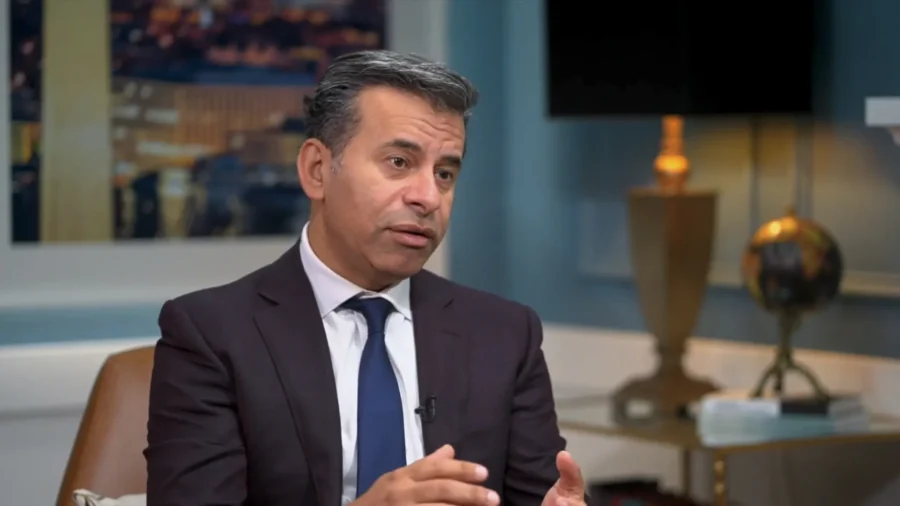Dr. Marty Makary, President-elect Donald Trump’s choice to lead the Food and Drug Administration (FDA), and Robert F. Kennedy Jr., his nominee to head the Department of Health and Human Services (HHS), are both critics of COVID-19 mandates, advocates for removing chemicals and toxins from America’s food supply, and proponents of greater transparency in medicine.
If both men are confirmed by the Senate in January 2025, Kennedy will serve as Makary’s boss, as the FDA is one of 13 agencies under HHS.
Makary, a professor and surgeon at Johns Hopkins University, has also criticized the use of pesticides on food, the overprescription of drugs, and the influence of insurance and pharmaceutical companies over physicians and government agencies, issues that Kennedy has been highlighting for years.
Kennedy has vowed to make significant changes to the FDA, National Institutes of Health (NIH), and the Centers for Disease Control and Prevention, all of which the former Democratic and independent presidential candidate believes are captured by corporations.
Kennedy congratulated Makary on his nomination.
“I am excited to work with you to restore the FDA’s proud tradition of gold-standard, evidence-based science, end corporate capture, and Make America Healthy Again,” he wrote in a Nov. 23 social media post.
Announcing Makary as his pick to head the FDA, Trump said in a Nov.22 Truth Social post that the agency has lost the trust of Americans and “lost sight of its primary goal as a regulator.”
Makary is needed to “course-correct and refocus the Agency,” Trump wrote, and to evaluate “harmful chemicals poisoning our Nation’s food supply and drugs and biologics being given to our Nation’s youth, so that we can finally address the Chronic Disease Epidemic.”
Makary, who earned a degree from the Harvard T.H. Chan School of Public Health and currently serves as the chief of islet transplant surgery at Johns Hopkins, appeared alongside Kennedy in a congressional roundtable hosted by Sen. Ron Johnson (R-Wis.) about health and nutrition.
He criticized federal health agencies for not addressing chronic diseases and said that “the greatest perpetrator of misinformation has been the United States government with the food pyramid.”
“We have the most overmedicated, sickest population in the world and no one is talking about root causes,” Makary said. “We have poisoned our food supply.
“We are so busy in our health care system billing and coding and paying each other and every stakeholder has their gigantic lobby in Washington D.C. and everybody’s making a lot of money except for one stakeholder, the American citizen.”
At Johnson’s roundtable, Makary also echoed beliefs that Kennedy espoused on the presidential campaign trail.
“We have poisoned our food supply, engineered highly addictive chemicals that we put into our food. We spray it with pesticides that kill pests. What do you think they do to our gut lining and our microbiome? And then they come in sick. The GI tract is reacting. It’s not an acute inflammatory storm. It’s a low-grade chronic inflammation. And it makes people feel sick and that inflammation permeates and drives so many of our chronic diseases that we didn’t see half a century ago,” Makary said.
Makary accused the U.S. health care system of “playing whack-a-mole” and “not talking about the root causes of our chronic disease epidemic.”
Doctors are told to “put your head down, focus on billing and coding,” Makary said.
“The country is getting sicker. We cannot keep going down this path. We have the most over-medicated, sickest population in the world. And no one is talking about the root causes.”

When Kennedy ended his independent presidential bid on Aug. 23 and endorsed Trump, he briefly outlined his plan should he be selected for a health-related post in the Trump administration.
“America can get healthy again. To do that we need to do three things. First, root out the corruption in our health agencies. Second, change the incentives of the health care system. And third, inspire Americans to get healthy again,” Kennedy said during a speech in Arizona.
Kennedy said little will change until major changes are made at the FDA, the CDC, and the Department of Agriculture.
“Their function is no longer to improve and protect the health of Americans,” he said at Johnson’s roundtable. “Their function is to advance the mercantile and commercial interests of the pharmaceutical industry that has transformed them and the food industry into sock puppets for the industry they’re supposed to regulate.”
Kennedy has vowed to dismiss the officials who lead those agencies and appoint replacements who will “turn them back into healing and public health agencies,” according to an interview with NBC News last year.
On Nov. 6, Kennedy said that the FDA should be trimmed.
“There are entire departments, like the nutrition department at the FDA … that have to go, that are not doing their job. They’re not protecting our kids,” Kennedy told MSNBC.
Initially, Makary shared views about COVID-19 that differed from Kennedy’s. In May 2020, the surgeon called for universal masking in an opinion column for The New York Times.
Later, he emerged as a vocal critic of COVID-19 pandemic responses.
During House testimony in 2021, Makary objected to the FDA’s insistence on mandatory boosters and criticized the U.S. approach to natural immunity.
“Over 20 scientifically sound studies have demonstrated that natural immunity is as good as or better than vaccinated immunity, yet our public health officials continue to ignore it. In fact, they never talk about it,” Makary said. “If the U.S. would have asked those who had COVID to step aside in the vaccine line until the vulnerable are vaccinated, we would have saved tens of thousands of more Americans with the vaccines we were using to [immunize] those already immune. Let me say that again, ignoring natural immunity has resulted in the preventable deaths of tens of thousands of Americans.”
Makary also works as a public policy researcher and is the author of multiple books, including two New York Times bestsellers, “Unaccountable” and “The Price We Pay.”
“Unaccountable,” which was released in 2012, chronicled serious problems in U.S. medicine, advocating greater transparency.
“The Price We Pay,” a 2019 book, delved into high costs and inefficiency in the U.S. health care system.
In a September interview with Dr. Mark Hyman, Makary implored fellow medical professionals to speak out against wrongdoing.
“The system is so broke, and the problem is we have a lot of smart people in a system where they’re just collecting their paycheck every two weeks, putting their head down. We feel like we’re cogs in the wheel, and people are afraid to get off the hamster wheel, take risks, and call things out,” Makary said.
In “The Price We Pay,” Makary said, his research team highlighted the issue of price gouging and predatory billing. There is a “massive trust problem” whereby 62 percent of Americans report they have avoided care or delayed care “for fear of the bill,” he said.
“One thing that unites everybody in medicine is everyone has a sense of compassion that drew us into this calling. So we got good people, but we walk into a bad system we designed. It’s a system we inherited, but we shouldn’t defend it. It’s entirely broken,” Makary told Hyman.
In his most recent book, “Blind Spots: When Medicine Gets It Wrong, and What It Means for Our Health,” Makary wrote that “groupthink” is one of the biggest health issues that we have.
During a September interview with Epoch TV’s “American Thought Leaders,” Makary described what he means by “groupthink.”
“When we as a medical profession use good scientific evidence to make health recommendations, we shine and we help a lot of people. But when we rule by opinion and issue these edicts based on the opinion of a small group of oligarchs in medicine, we have a terrible track record with health recommendations,” Makary told “American Thought Leaders” host Jan Jekielek.
“When we use opinion and just making a recommendation based on a gut feeling we don’t have a good track record we’ve got to get back to the scientific process. In order to do that, you’ve got to have impeccable objectivity. You’ve got to be objective. You’ve got to have humility to recognize what you believe may be wrong.”
Transparency should become commonplace among medical professionals, Makary said.
“If pharma does a study, regardless if that study goes their way or not, we should get the results immediately. That is a basic new principle of transparency we need to adopt in the United States,” Makary told Hyman.
Makary referenced Paxlovid, an antiviral COVID-19 treatment made by Pfizer.
“When that came out, the government recommended that for everyone. A study was published in the New England Journal of Medicine just a number of months ago that showed zero benefit in people under 65. None, zilch,” Makary said. “The study ended nearly two years prior. Why did the public not see it for not only two years? Because it didn’t go their way. When the COVID vaccine booster goes their way, they tell you before anything’s even published … We need more civil discourse in medicine. We need less cancel culture.”
Makary is one of three major nominations Trump has made among agencies managed by HHS.
Dr. Dave Weldon, a former congressman and physician, was nominated to lead the CDC.
Trump nominated Dr. Mehmet Oz to serve as administrator of the Centers for Medicare and Medicaid Services.
Kennedy was tapped to guide HHS on Nov. 14.
On Nov. 17, The Epoch Times reported that Dr. Jay Bhattacharya, a professor of health policy at Stanford University, is a top contender to lead the NIH. Trump has yet to announce his choice to lead the agency.
From The Epoch Times

